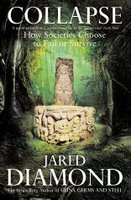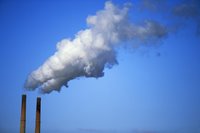
By Jared Diamond
Pulitzer prize winning author, Jared Diamond examines how great civilizations in the past have collapsed, offering insight to how modern society can benefit from their failures. While Diamond focus on several civilizations in his book, in this blog I will focus my discussion only on one…China, and their developing modern problems~
Diamond highlights China’s environmental problems in the following categories. Air, water, soil, habitat destruction, biodiversity losses, and mega-projects. He explains how air pollution in China is the worst in the world, with acid rain falling in ¼ of their cities (over half of their rainy days annually). To top that off, water quality in China is some of the worst in the world, with severe water shortages in over a hundred cities annually. Additionally, some business suffers halts in industrial production due to lack of water. Perhaps if businesses were more efficient about their use of water, or they reclaimed more of it, they would not need to shut down entire factories due to the lack of H20.
Soil problems such as desertification are affecting China, and since the country does not have many recycling programs according to Diamond, many of the cities are surrounded by trash. I am interested to see how bad their environment is as I have studied solutions to such problems, and soon China will need to step up to the plate and do a better job taking care of their environment. Also, since fish consumption is a large part of the Chinese diet, overfishing has resulted in massive depletions of Chinese fishery stocks. Many species of fish which once flourished in the rivers and coastal waters must now be imported, while Chinese rivers have recently been closed down to overfishing. Diamond explains how China and the rest of the world falls into the Tragedy of the Commons…where there is a conflict for resources between individual interests and the common good. Fortunately, new standards are being taken practicing sustainable fishing.
are surrounded by trash. I am interested to see how bad their environment is as I have studied solutions to such problems, and soon China will need to step up to the plate and do a better job taking care of their environment. Also, since fish consumption is a large part of the Chinese diet, overfishing has resulted in massive depletions of Chinese fishery stocks. Many species of fish which once flourished in the rivers and coastal waters must now be imported, while Chinese rivers have recently been closed down to overfishing. Diamond explains how China and the rest of the world falls into the Tragedy of the Commons…where there is a conflict for resources between individual interests and the common good. Fortunately, new standards are being taken practicing sustainable fishing.
Additionally, China’s bio-diversity is at risk with over 10 percent of the world’s plant and terrestrial vertebrate species living in China. Unfortunately many of these species, such as the Panda, are endangered due to China’s bulging population.  The author blames China’s escalating habitat destruction is mostly from the fact that their nation is consuming wood faster than they can renew it. Diamond points out that Big business often maximized its profits in the short term by harming the environment and people. Though, some businesses are becoming sustainable with the help of government, Diamond argues that these environmental business will need public support in order to survive. He suggests that the only way that business can be successfully eco-friendly is for the public to prefer to buy eco-friendly products, thereby increasing demand for these goods, driving away competitors who can often produce the same product more inexpensively by using environmentally harmful methods. Diamond points out that without government intervention and support from consumers it will be difficult for environmentally friendly business to prosper.
The author blames China’s escalating habitat destruction is mostly from the fact that their nation is consuming wood faster than they can renew it. Diamond points out that Big business often maximized its profits in the short term by harming the environment and people. Though, some businesses are becoming sustainable with the help of government, Diamond argues that these environmental business will need public support in order to survive. He suggests that the only way that business can be successfully eco-friendly is for the public to prefer to buy eco-friendly products, thereby increasing demand for these goods, driving away competitors who can often produce the same product more inexpensively by using environmentally harmful methods. Diamond points out that without government intervention and support from consumers it will be difficult for environmentally friendly business to prosper.
Another important aspect which Diamond confronts is how international trade has effected China’s environment. A 60 fold increases in international trade has resulted in invasive species becoming major problem in China. These pests effect agriculture, and as have been known to be a primary cause of food shortages. In a nation struggling to feed over a billion hungry mouths, the last thing they need is an invasive beetle eating their crops. The author also confronts a unique problem of exporting which we often overlook….Homosapien exportation. China is exporting humans at alarming rates. While studying abroad in New Zealand in 2004 I was privileged to witness first hand how dramatic of an effect China is having on an island nation such as New Zealand. With a population of just over a million people, the New Zealand and Australian governments are granting permanent visas to Chinese in order to boost their countries revenue. Unfortunately, this is becoming a controversial issue, and I was able to see it first hand. New Zealand is experiencing the effects of a growing foreign population as the cities are growing at rates higher than ever before.
exporting humans at alarming rates. While studying abroad in New Zealand in 2004 I was privileged to witness first hand how dramatic of an effect China is having on an island nation such as New Zealand. With a population of just over a million people, the New Zealand and Australian governments are granting permanent visas to Chinese in order to boost their countries revenue. Unfortunately, this is becoming a controversial issue, and I was able to see it first hand. New Zealand is experiencing the effects of a growing foreign population as the cities are growing at rates higher than ever before.
Diamond continues to point out China’s worldwide effect on global air quality. The country has exponentially increasing Carbon Dioxide emissions & the world’s highest sulfur oxide emissions. China is nice enough to share these pollutants with parts of Asia and the south pacific as the particles are propelled eastward to Korea, Japan and eventually across the US, and Canada, due to their coal-burning economy. Ironically, the pollutants which are produced by American Industries in China are eventually blown back into the country. It’s kinda like pissing in the wind. Nobody wins.
More and more, the Chinese have the desire for the standards of living similar to first world consumers. This is an extremely frightening thought. While it is selfish of privileged Americans to want to keep our first world standards and not share, the implications of China’s standard of living, rising to first world standards could be horrific. In ‘Collapse’ Diamond explains if China’s one billion people were to increase their per capita consumption rate, this would nearly double the total resource use and environmental impact of China. In a country which already has extreme environmental problems, the effect of this rise in the Chinese standards would affect everyone. Diamond anticipates that China’s problems will becomes the rest of the world’s problem. There’s no way around it.
living, rising to first world standards could be horrific. In ‘Collapse’ Diamond explains if China’s one billion people were to increase their per capita consumption rate, this would nearly double the total resource use and environmental impact of China. In a country which already has extreme environmental problems, the effect of this rise in the Chinese standards would affect everyone. Diamond anticipates that China’s problems will becomes the rest of the world’s problem. There’s no way around it.
Since China’s joining the WTO, it has lowered the tariffs and increased imports and exports. Diamond suggests that one benefit which could result from China’s WTO involvement is that more strict environmental standards would be enacted in the country. Diamond elaborates on disturbing facts in ‘Collapse,’ but he does see light at the end of the tunnel. China has begun to recognize that environmental problems are arriving in China. With the Olympics arriving in 2008, China has begun to erect a Greenwall or treebelt is being built around Beijing to stop harmful dust and particles to reach the city. Additionally, China has enacted air pollution restrictions on cars mirroring those in Europe. Over 1,000 nature reserves have been created to help preserve its biodiversity. Other Chinese methods of environmental progress mentioned by Diamond include replanting projects, raising fish in rice fields and logging bans. While these environmental solutions alone will not solve the environmental problems produced by one billion Chinese, they are on the right track.
Diamond points that the ‘top down’ government style of China is beginning to recognize that population is no longer the largest problem to their bulging country, but rather it is the environmental problems resulting from its people. China’s interests will need to include the environment if it wants to sustain itself as the next world superpower.
Another interesting point Diamond presents is how pollution intensive firms move to China to do business. Some of these companies have left their countries of origin to set up shop in China as they are now illegal in China. One such industry which has affected me has been the surfboard industry. The once dominant Clark Foam, which produced nearly all the foam needed for surfboard production, was shut down in December of 2005, due to increasing pressure from stringent California State and federal EPA standards. Now that Clark foam is no longer producing surfboard blanks, production in China will surely increase, as ‘cookie-cutter’ board are now being produced in mass quantities in China, and supplied by warehouse stores such as Costco. It seems unfortunate that pollution intensive industries of first world countries being sent to the China. Not only are American companies loosing revenue, but our country is often hit like a boomerang with the same environmental problems we originally tried to banish.
As a fellow geographer, Diamond explains the phenomenon of struggling civilizations in a way which I can truly appreciate. Using my MBA degree and undergraduate Environmental Science BS degree I am optimistic that I may be able to create a positive impact about the way China is currently doing business. While correcting environmental problems is sometimes costly and inconvenient, methods are available which increase efficiency which would in turn increase revenue and help conserve the countries environment for the next billion Chinese. Nobody wants to live in a world where you have to walk around with a gas mask on, and worry about picking up a disease when you walk outside. China seriously needs to confront these issues as they are heading down a dangerous road.
 By Jared Diamond
By Jared Diamond are surrounded by trash. I am interested to see how bad their environment is as I have studied solutions to such problems, and soon China will need to step up to the plate and do a better job taking care of their environment. Also, since fish consumption is a large part of the Chinese diet, overfishing has resulted in massive depletions of Chinese fishery stocks. Many species of fish which once flourished in the rivers and coastal waters must now be imported, while Chinese rivers have recently been closed down to overfishing. Diamond explains how China and the rest of the world falls into the Tragedy of the Commons…where there is a conflict for resources between individual interests and the common good. Fortunately, new standards are being taken practicing sustainable fishing.
are surrounded by trash. I am interested to see how bad their environment is as I have studied solutions to such problems, and soon China will need to step up to the plate and do a better job taking care of their environment. Also, since fish consumption is a large part of the Chinese diet, overfishing has resulted in massive depletions of Chinese fishery stocks. Many species of fish which once flourished in the rivers and coastal waters must now be imported, while Chinese rivers have recently been closed down to overfishing. Diamond explains how China and the rest of the world falls into the Tragedy of the Commons…where there is a conflict for resources between individual interests and the common good. Fortunately, new standards are being taken practicing sustainable fishing. The author blames
The author blames  exporting humans at alarming rates. While studying abroad in
exporting humans at alarming rates. While studying abroad in  living, rising to first world standards could be horrific. In ‘Collapse’ Diamond explains if
living, rising to first world standards could be horrific. In ‘Collapse’ Diamond explains if 


1 comment:
Good review. - Prof. Carr
Post a Comment